SEPTEMBER 26 TO
OCTOBER 5 2025
OCTOBER 5 2025
SEPTEMBER 26 TO
OCTOBER 5 2025
OCTOBER 5 2025

Biochemists Ruedi Aebersold and Matthias Mann have been awarded the Dr H.P. Heineken Prize for Biochemistry and Biophysics 2024. The jury praises their pioneering work in the field of proteomics and in particular their contributions to new techniques to study large amounts of proteins simultaneously. Thanks to their achievements, we better understand how healthy cells work and what goes wrong in
disease. Both Aebersold and Mann are recipients of the Bijvoet Medal, and Mann was awarded an honorary doctorate by Utrecht University in 2004.
In 2024, it will be 60 years since Alfred Heineken created the very first Heineken Prize: the Dr H.P. Heineken Prize for Biochemistry and Biophysics. To mark this special anniversary edition, the jury has decided to award the prize to not one but two top scientists. By doing so, the jury not only honours the work of Aebersold and Mann, but also the field of proteomics.
Drivers of proteomics
Proteins are involved in all processes in the body. Without proteins there is no cell division, metabolism or growth. For a long time, it was thought that each protein performs one specific function. We now know that biology is much more complex. It turns out, for instance, that one protein cooperates with many di!erent proteins to perform various functions. So to understand how processes work in our body, it is not only necessary to identify the proteins but also to uncover their interactions. Large-scale research into proteins is called proteomics. Click here for more info.
This part of the programme is co-organised by Utrecht Life Sciences.
Language
English
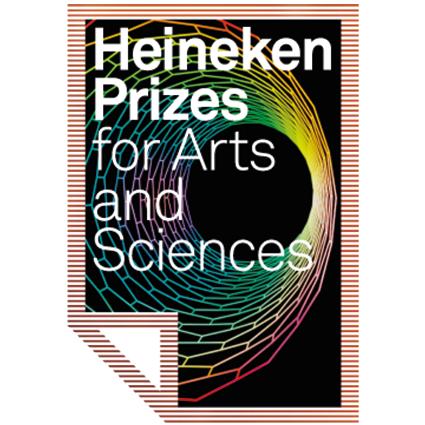

During this event, scientists,
faculty, staff, and students will meet and inspire each other. During this
meeting, we will look back at the actions within Planetary Health at UU and
within the Life Sciences community, discuss the role of the university in
transitions, and further shape the shared vision for Planetary Health. We will identify opportunities for a joint
Planetary Health research agenda and discuss creative ideas and strategies to
promote societal change.
The meeting will be concluded with
drinks and (live) music.
This part of the programme is organised by Utrecht Life Sciences.
Language
English
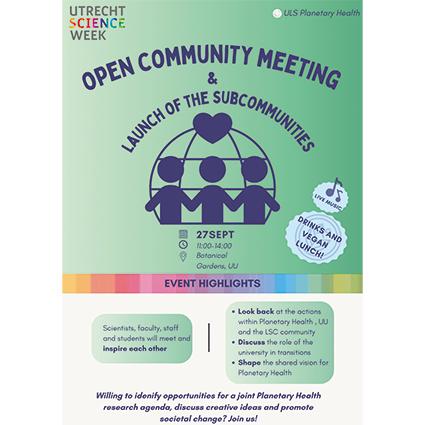
The Betweter Festival is here again! Once again, this edition will fill TivoliVredenburg with a unique mix of talks, music, film, interactive installations and live scientific research. Scientists and artists expand your world in times of restricted vision. They ask the questions that matter and dream about the world of tomorrow.
The Betweter Festival is organised by Utrecht University. Main partners are UMC Utrecht, Hogeschool Utrecht and Hogeschool voor de Kunsten Utrecht.
Other partners include Universiteit voor Humanistiek, TivoliVredenburg, SETUP, BNR and Centre for Unusual Collaborations. The festival is the opening event of Utrecht Science Week.
Buy your ticket today!
Language
Dutch
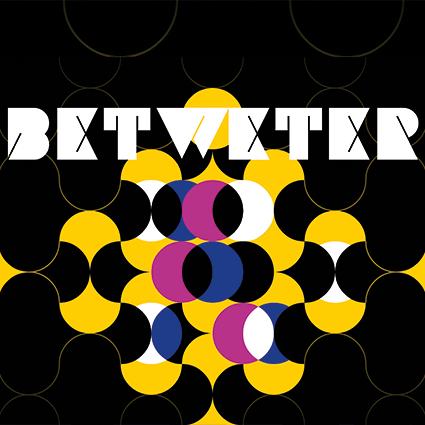
During the Symposium "Beyond Animal Testing in Biomedical Science", you will get a sneak preview of an animal-free future!
There will be demonstrations of state-of-the-art techniques in the innovation labs of the HU University of Applied Sciences Utrecht (HU) in cooperation with UMCU and UU. These labs are closely linked to the Transition Programme to Animal-free Innovations (TPI) programme and the newly established national Centre for Animal-Free Biomedical Translation (CPBT).
So would you like to experience:
- What are the current and future opportunities for animal-free innovations?
- What research and collaborations are ongoing within the Utrecht Science Park in the field of animal test (free) innovations?
- What your future work field (both in the master's programme and in the professional field) might look like?
- What state-of-the-art techniques our innovation labs have to offer in the field of Imaging & VR, 3D Bioprinting, AI & Machine Learning and Advanced cell culture methods?
Then reserve Friday 27 September in your calendar!
Click here for more information.
Language
Dutch
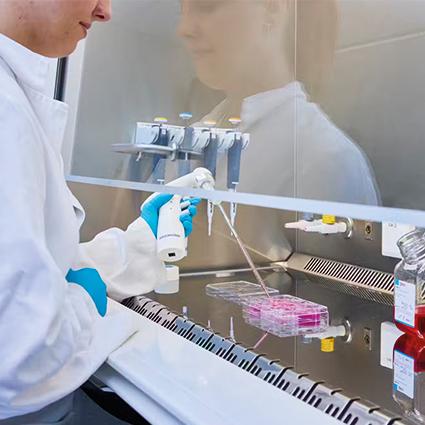

Professor dr. Peter Luijten is vice dean
of the Strategic Theme Life Sciences and Professor of Functional Medical
Imaging. Before his farewell at Utrecht University in October, he will give
the Utrecht Science Lecture.
His lecture will focus on the theme “From science to impact: Utrecht Life Sciences”, including contributions from talented colleagues from various Life Sciences thematic communities, under which Tzviya Zeev Ben Mordehai, Nico van den Berg, Karijn Suijkerbuijk and Marianna Tryfonidou.
From science to impact: Utrecht Life Sciences
It is hard to imagine a place that encompasses more disciplines vital for top research in life sciences than the Utrecht Science Park. From 'hard core' molecular biology, chemistry, mathematics and physics to translational and clinical sciences. From molecules to micro-organisms, plants, animals and humans. From drug development to medical technology. All these areas of expertise within walking distance. This lecture shows and talks about the unique accomplishments of Utrecht's Life Sciences and highlights the opportunities for social impact in the future.
Practical information
Programme:
o 15.30
walk-in
o
16.00
opening by Jan Henk van der Velden, Anton Pijpers, Arno Hoes and Wilma Scholte
op Reimer
o
16.15 Utrecht Science Lecture by Prof
Peter Luijten
o
from
17.30 drinks
This
part of the programme is co-organised by Utrecht Life Sciences.
Language
English
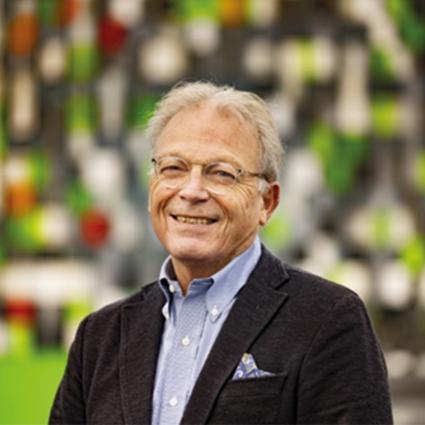
This year's Boulevard of Dreams is specifically aimed at researchers. It is your chance to discover how to get the best support for both your research and career development. Our experts from the Research and Innovation Support Centre and other colleagues will be there to guide you in finding the right research facilities and resources.
You will also have the chance to interact with our key partners, including Utrecht University, the EWUU Alliance and Utrecht Life Sciences. They will present themselves and show how they can strengthen and support your research.
You can also enjoy demonstrations of groundbreaking research from UMC Utrecht's various strategic programmes. Be inspired by the latest innovations and insights.
Don't miss out and visit the Boulevard of Dreams!
Language
Dutch
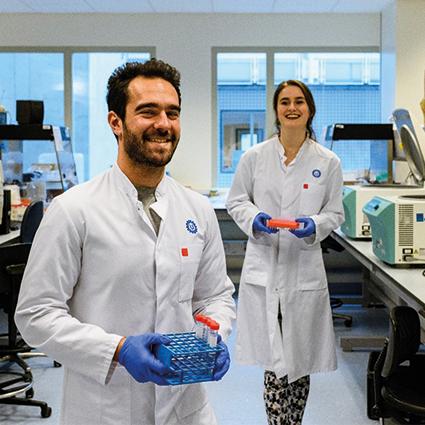
Research drives the advancement of knowledge and health, but did you know that an estimated 85% of biomedical research was pointless in 2009? (Bio)medical research also accounts for 2% of global plastic waste, and research priorities do not always match stakeholders' needs. The recently developed guide ‘Socially Responsible Research’ contains questions that help (future) researchers and teachers reflect on the characteristics of valuable scientific research.
But how are these questions translated into current scientific practice? And how are the social value, scientific value and ecological impact of biomedical research weighed against each other? This is what the CO2- Assistant will discuss with you and a diverse panel of experts. Explored in this panel disucssion, how to increase the societal impact of research while reducing waste. When is research useful for society? And is there research that really should no longer be carried out? Discover answers to these questions and help think about the future of (bio)medical research.
This programme event is organised by the CO2 Assistant and the Life Science Community Planetary Health.
Programme
15:30 walk-in 16:00 to 17:30 programma, followed by drinks.
Language
Dutch
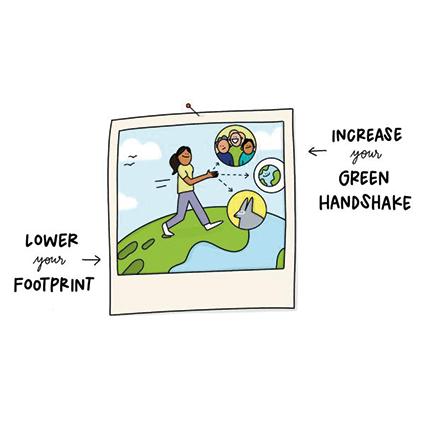
More and more disinformation and misinformation about climate change is being spread through social media. From obvious nonsense, to good-sounding opinions about what we should do and about whether it still makes sense to take action. Suddenly everyone is a climate or transition expert; people know better than the real expert. Despite the danger of disinformation, a serious dissent from the government and the academy is as yet lacking. What are the dangers of disinformation and how should we as scientists deal with it? Take part in this workshop, learn to recognise and counter disinformation, and engage in a discussion with colleagues and experts.
Workshop led by Mario Veen.
This event is organised by Utrecht Life Sciences Planetary Health in cooperation with Utrecht University of Applied Sciences.
Language
Dutch
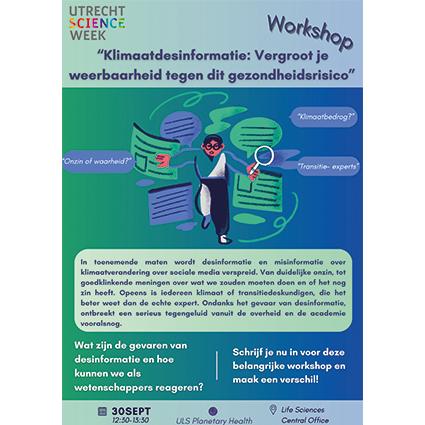

Coherent changes in human behaviour are crucial in
making a transition to a healthy and sustainable society. How can such changes
be stimulated? In other words, which
initiatives will be successful and which ones will not? Understanding the mechanisms of success in
such a complex system as human
interactions, the topic of the workshop, will be
helpful in answering these questions.
"Too
often, accomplishment does not equal success. We did the work but didn't get
the promotion; we played hard but weren't recognized; we had the idea but
didn't get the credit. We convince ourselves that talent combined with a strong
work ethic is the key to getting ahead, but also realize that combination often
fails to yield results, without any deeper understanding as to why. " -- "The Formula" by Albert-Laszlo Barabasi
Are you also wondering why performance is necessary
but not adequate? Why are experts often wrong? How to assemble a creative team
primed for success? How to most effectively engage our networks? Please come to
the workshop on "Science of Success" demonstrated via wine tasting
and scoring. With a Master Class on "The Universal Laws of Success"
given by dr. Qingyi Feng (CCSS Coordinator), followed by experiment on
"Science of Success" demonstrated via wine tasting and scoring.
Audiences will participate in discussions/experiments on "Science of Success", and/or just chill with ice-creams.
Language
English
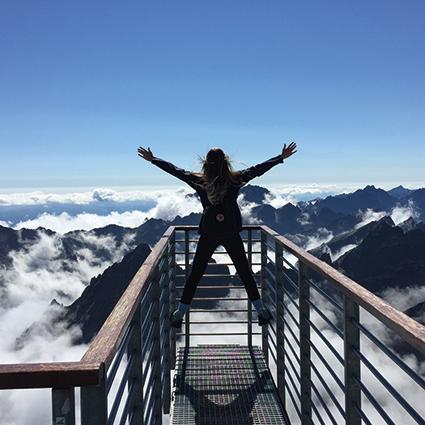
Please note that this is a private event, in which you can attend by invitation only.
The theme of this evening is 'Utrecht Cancer', highlighting the unique added value of the concentration of knowledge within one square kilometre and cooperation at the Utrecht Science Park, and showing how this cooperation contributes to pioneering research and developments in cancer treatment.
This
part of the programme is co-organised by Utrecht Life Sciences.
Language
Dutch
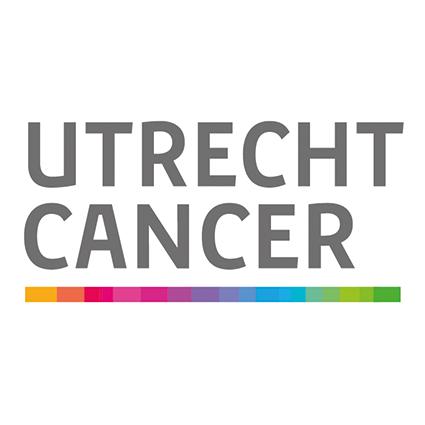
Okay wait. Sea levels are rising and we continue to live quietly in our low country? Isn't faith in the dykes a bit delulu? Find out during this evening!
To open the HU Sustainability Day, the HU University of Applied Sciences Utrecht is organising an event the night before with none other than Nicolaas Veul and his docu 'The Climate Explorer'. You undoubtedly know him from his documentary Pisnicht: the movie or from his 100 days series. In The Climate Explorer, Nicolaas investigates what the rising sea level means for the Netherlands. 'How long will we keep our feet dry here in Utrecht?'. The inner city is safe for now, but Leidsche Rijn could be flooded within a generation! Nicolaas explores the risks and looks for a plan B.
Are we all going to emigrate to Norway or will the Achterhoek become the new Randstad? Nicolaas has figured it out for you! Lean back and be surprised by this film. Afterwards, there is a talk with Nicolaas and there will be room for questions from the audience. Don't miss it and sign up!
Sign up
The programme is open to everyone: HU students, HU employees, UU students and anyone outside who is interested in this topic. Reserve your spot and be there for free!
Pizza promotion for HU students
Stick around the HU after your class for our Vega Pizza Party at 18:30, prior to movie night! For only 5 euros, you get a vegetarian pizza and a drink. Prefer a vegan pizza? Send an email to podium@hu.nl and it will be arranged!
Language
Dutch
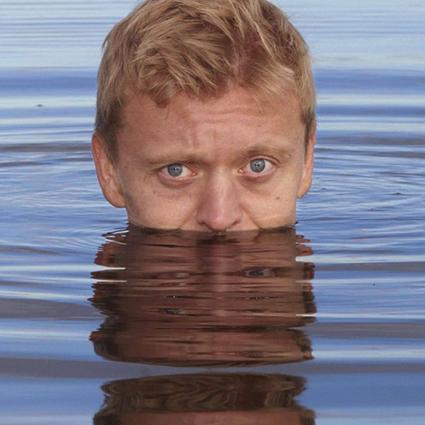
Welcome to the dialogue Travelling Together! This is organised in response to the particularly valuable results of the Sustainable Transport Experiment. Celina Kroon, Programme Manager for Sustainability at UMC Utrecht, will work with participants to make travel to and from the Utrecht Science Park even safer.
The focus is on travelling by bike. Because cycling is healthy and sustainable. But is cycling also safe? As the days get wetter and shorter again, the enthusiasm for travelling by bike always decreases. Against the rain, a rain suit helps, but cycling alone in the dark sometimes makes you feel unsafe. Especially now that there has just been another bike puller active.
How can you feel alone in an area where more than 30,000 people work and 70,000 travel daily? What to do to make travelling by bike safer? How do you organise cycling together and make cycling routes socially safer? What should an app aimed at cycling together meet? Are there other barriers that need to be addressed?
In short: the dialogue offers plenty of room for ideas, suggestions, concepts, recommendations and experiences to make travelling even more socially safe and sociable. We would also like to hear your input as an experience expert. What are we going to work on first?
Be sure to register. Then we know we can count on you!
Language
Dutch
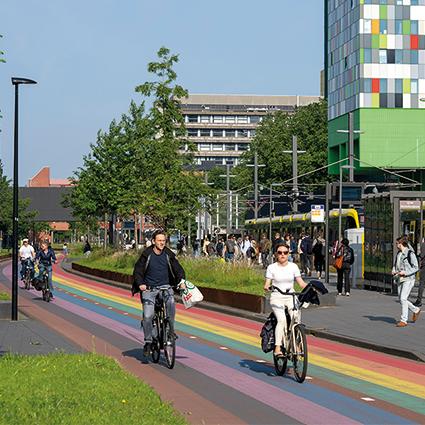

Researchers and research supporters are not only expected to work on excellent research, they are also expected to have an impact on society. While individual researchers and research supporters choose different ways to have such an impact, ranging from outreach to protest actions, there is no consensus within the research community on which form of engagement is the most effective nor a unique answer to the crucial question whether activism impacts the credibility of those engaging in it.
In this workshop, there a debate is held (‘lagerhuis’-style) to collect and test arguments for and against activism by researchers and research supporters. The audience will be randomly divided into two groups, with the assignment to prepare arguments in favour or against a specific form of activism. The groups will then be given the opportunity to exchange their positions during a short debate. The goal is to sharpen the thinking within the audience on when (or when not) people working in and around research can and ought to be activistic.
Under the guidance of Erik van Sebille, Professor of Oceanography and Professor of Public Engagement.
Language
English
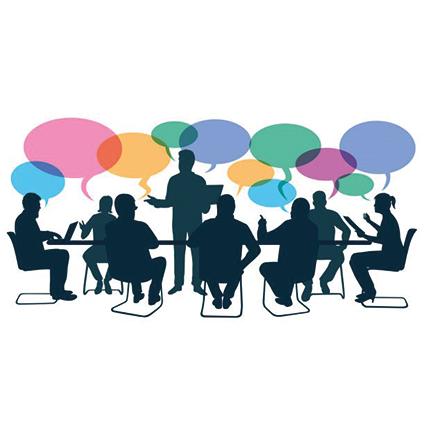
YOUR OWN CELLS AS MEDICINE!
Imagine a world where there is no shortage of donor organs and where organs damaged by injury, disease, wear and tear or bad genes can be repaired by using the body's own cells. It sounds like future music, but reality is closer than you think. Discover how diseases can be treated with your own cells and be surprised by the latest science and exciting demonstrations.
LECTURES
- Roel Custers, orthopaedic surgeon: ‘Osteoarthritis in the knee is a growing problem and an artificial knee is not always successful. Body-own cartilage cells and modern technologies like 3D bioprinting are promising.’
- Karin Gerritsen, nephrologist: ‘Patients with severe kidney failure need dialysis or a kidney transplant. The disadvantages of dialysis and the shortage of donor kidneys inspire alternatives. The ‘wearable artificial kidney’ makes dialysis better, more sustainable and less stressful.’
- Joost Fledderus, biologist: ‘Stem cells for dummies: why are stem cells so important and how can they change the future of treatments? They help better understand the origins of diseases and are used to design personalised medicines.’
- Manon Benders, paediatrician-neonatologist: ‘Every year, over 5,000 babies are born in the Netherlands with a difficult start. They are admitted to an intensive care unit. This causes brain damage in some cases. Stem cells, administered through nasal drops, help repair the damage.’
- Sabine Fuchs, paediatrician in metabolic diseases: ‘Metabolic diseases are among the leading causes of death for children. But this could change! The latest genetic techniques are being used to work on cures for metabolic diseases.’
- Renske ten Ham, health economist: ‘Cell and gene therapies can be life-saving for patients in whom other treatments do not help. The complexity of working with cell therapies makes them much more expensive than regular treatments. The price of innovation: what can it cost?’
DEMONSTRATIONS
- Intimate Implant: what is it like to live with a regenerative implant? Medical ethics researchers Anne-Floor de Kanter and Manon van Daal developed the art project Intimate Implant with designer Bertrand Burgers. Three art objects let you feel what a regenerative implant does to you.
- HelpdeskRM: what do you want to know? Find your own answers on this website (RM=Regenerative Medicine). What are stem cells? Will we soon be able to print whole organs? What is gene therapy? How do you make an organoid? Put your questions to the experts.
- BIOBank: talking together about organoid development as a business model. Can it be done just like that? The possibilities of applying organoids seem limitless. Whereas originally mainly hospitals and scientists were concerned with this, now industry too sees the enormous commercial potential. But should we really want it? Join bioethicists and health economists on the couch.
- ICAT: how do you translate pioneering innovations into mainstream patient care? Employees of the Innovation Centre for Advanced Therapies (ICAT) will talk to you about the enormous challenge of translating the spectacular results of top researchers into everyday practice: clinical applications.
- Tailor-made medicine: how your own cells predict whether a drug will work on you Using stem cells, you can grow organoids. One of the advantages of organoids is that you can test drugs on them. Jeffrey Beekman and his team tell doctors which medication works on which patient and which does not.
- 3D technology: will we soon be able to print entire organs? Jos Malda's research group is developing new bio-printing techniques and tissue-specific bio-ink. By 3D printing living cells and supporting materials, they are working on the development of implants to treat joint damage and wear and tear in humans and animals, among others.
PROGRAMME:
18.30 walk-in & demonstrations
19.00 lecture programme with demonstrations in the break
22.00 end.
This
part of the programme is co-organised by Utrecht Life Sciences.
Joost Fledderus and Roel Custers warmly invite you to attend. Watch the videos here.
Registration is no longer possible, would you like to be put on the waiting list? Then click on the subscribe (external link) button below.
Language
Dutch
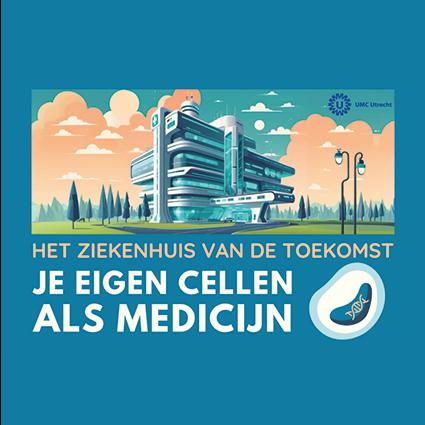
What does ‘care’ mean in a world that is constantly changing? This is a question that occupies many HKU graduates. Health and climate affect us and each other. They require a review of how we, human and non-human, are going to collectively care for our world. To really start doing things differently, it is essential to question existing norms and shape new ones. In this context, the question arises: what kinds of knowledge do we take seriously, and how do we become more inclusive? Traditional, disciplinary forms of research are no longer adequate. Artistic research offers an attitude and method, which is sensory, phenomenological and meaningful. These research methods help us search for the everyday puzzle pieces needed to better understand the world around us. And to reshape it.
On 1st of October, amid the Future Health Expo 2024 ‘Het Binnenste Buiten’ in Utrecht's Botanical Gardens, we would like to dive into the rich palette of research HKU has to offer with you, to reflect together on artistic, co-creative and caring ways to better understand and shape our world.
Programme
Plenary opening, venue: La Tentina
Hosts: Gjilke Keuning (Kwartiermaker Art of Care and Welfare) and Veerle Spronck (Associate lecturer Value(n)full Entrepreneurship in and by the Arts)
10:00 - 10:30: Walk-in/reception
10:30 - 10:45: Welcome
10:45 - 11:00: Introduction from the HKU Research Unit by Nirav Christophe (Lecturer Frontier Shifting Artistic Practices)
11:00 - 11:25: Keynote carousel: a refreshing HKU dive into social issues
11:25 - 11:45: Coffee/tea break
11:45 - 12:00: Performance ‘Schemertij’ Loes ten Den (alumna HKU Design for Change and Innovation)
12:00 - 12:20: Panel discussion ‘Pedagogies of Care’ (including Fabiola Camuti (lecturer Critical Creative Pedagogies))
12:20 - 12:30: Closing of morning, explanation tour + workshops
12:30 - 13:30 Lunch + Choice Expo tour or Expedition tour
13:30 - 15:00 Round 1: Workshops
Choice 1.
Co-creative and inclusive research: how to do it?
Led by Jolanda Schouten (visual artist and lecturer at HKU)
Location: Greenhouse
Choice 2.
Careful improvisation
Led by Joost van Wijmen (social designer) i.c.w. University of Humanistics and Meaningful Artistic Research
Location: La Tentina
15:00 - 15:30 Changeover + break
15:30 - 17:00 Round 2: Workshops
Choice 1.
Higher (arts) education as a caring ecosystem? Getting started!
Led by Fabiola Camuti, Walter van Andel & Veerle Spronck (lecturers HKU)
Location: Greenhouse
Choice 2.
Meet your non-human neighbours
Led by Martijn van Gessel (lecturer and researcher HKU)
Location: Stretchtent
17:00 - 17:30 Plenary closing
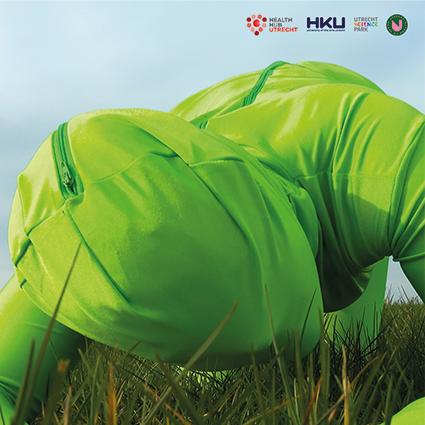
On Tuesday 1 October, the Dag van de Duurzaamheid will be organised by HU University of Applied Sciences Utrecht as part of Utrecht Science Week.
A great programme has been created, with plenary parts, workshops, a Green Market and a festive closing on the sustainability square.
The programme
This year's programme consists of the following parts:
10.30-12.00 – Plenary programme; including:
12.00-13.00 - Lunch at the Green Market for all visitors
13.00-14.30 - Workshop round (workshops tp be completed)
14.30-16.00 - Networking at Green Market
The Dag van de Duurzaamheid takes place at the University of Applied Sciences Utrecht, at Padualaan 101 in the main lecture hall.
Language
Dutch
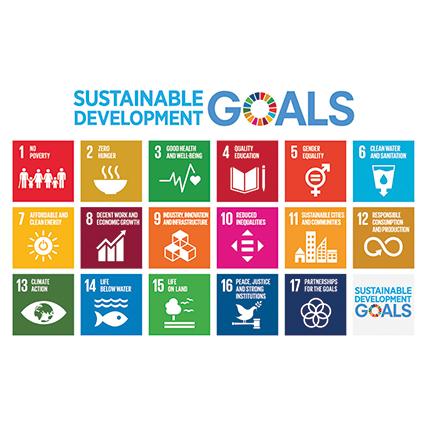

The KNAW report on Planetary Health
argues that technological adaptation is probably insufficient to counter the
ecological crisis and for society to function within Planetary Limits. Leading
thinker and economist Jason Hickel wrote the book “Less is more” about the
necessity and opportunity of outgrowth economies (“Degrowth”). He describes
how infinite economic growth always comes at the expense of people, animals or
nature, and how a society that does not focus primarily on growth can have
health, equity and well-being at its core. Intrigued by these ideas? Or perhaps
you have doubts? Come to the book club, learn more about de-growth and join us
in conversation.
Workshop led by Megan Milota.
This programme element is organised by Utrecht Life Sciences Planetary Health in collaboration with De Nieuwe Utrecht School.
Language
English
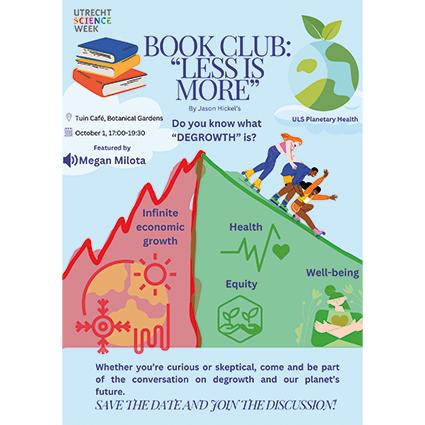
See our beautiful, but also fragile, planet Earth from above!
Take a ride in the SpaceBuzz and experience the ‘overview effect’ experienced by astronauts in space! SpaceBuzz is a more than 15-metre-long rocket vehicle equipped with the latest 4D Virtual Reality (VR) technology. On board, led by commander André Kuipers, you go on an expedition into space. A journey that will change your perspective of Earth forever.
Practicalities:
The SpaceBuzz is part of Hogeschool Utrecht's Sustainability Day and will be on Genevelaan 7 all day, but from 10:30 to 12:00 the SpaceBuzz is open to everyone, even if you are not a Sustainability Day visitor. Register on the spot for a 20-minute flight and have this unique experience!
Be quick, as there are only a limited number of places available. Registration can be done at the SpaceBuzz itself.
Please note: Before and after this time period, the SpaceBuzz is only available to visitors of Sustainability Day.
Have fun at the SpaceBuzz!
Language
Dutch
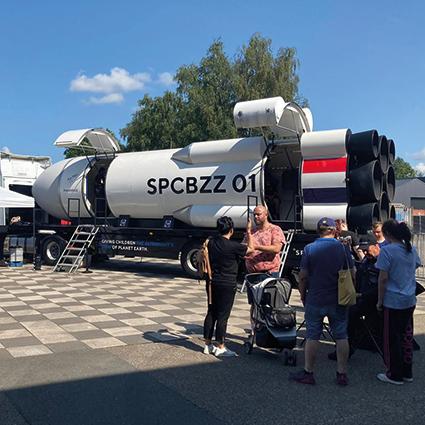
‘In the Netherlands, water managers have long been warning about problems with water quality and availability of clean drinking water. Yet not enough seems to be happening. Is a disaster needed, or are we finally going to act on what the situation demands?’
Marjolijn Haasnoot, climate adaptation researcher at Deltares and Utrecht University.
Talking to politicians, scientists, technologists, communication professionals, teachers, entrepreneurs and other professionals about who is going to do what to provide the Netherlands, Europe and the world with sufficient and qualitative (drinking) water.
Programme
15.30 Welcome and opening
Michiel van der Stelt, Programme Manager Sustainability Hogeschool Utrecht
and Roberta Hofman, Senior researcher Hogeschool Utrecht & KWR
15.45 Analysis
Thomas ter Laak, senior researcher in Chemical Water Quality KWR
15.55 Working together on healthy and circular water: what are we going to do and who does what?
Dialogue with participants and panel led by Michiel van der Stelt
Panelists:
· Cis Apeldoorn, Secretary-Director Hoogheemraadschap De Stichtse Rijnlanden
· Arjan van den Born, General Director ROM Utrecht
· Doeke Schippers, Leading Professional Vitens
· Thomas ter Laak, senior researcher in Chemical Water Quality KWR
16.50 Reflection on urgency, priorities and feasibility
Martin van Gelderen, Department Head Substances and Water Chain Ministry of IenW
17.00 End of dialogue; drinks and discussion.
Language
Dutch
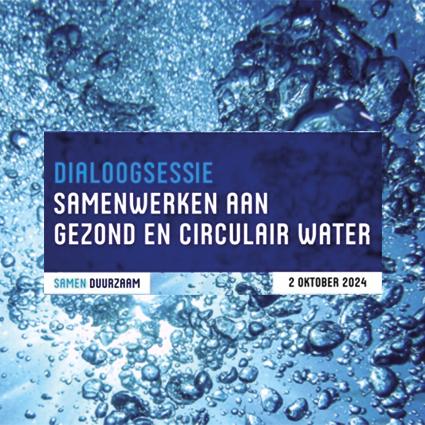

During this event we will explore
the future of our foodsystems, through art, photography, science, imagination
and living libraries.
Our food systems are making the planet and its inhabitants sick. 44% of our habitable land is used for intensive agriculture and animal husbandry. This agriculture leans on the use of manure, pesticides and frequent water use. It thus pushes the limits of our planet, pollutes our water, air and food, and thus threatens our health. Moreover, this sector employs people in the most vulnerable positions, who are hit hard by the climate crisis. Reducing food waste and working towards plant-based(er) food systems rank high (solutions 3 and 4, respectively) in the solutions to effectively combat climate change. During this evening, we will explore how we can organise our health systems differently and more fairly for the health of nature and humans.
After the opening lectures, the session will take a living library form. Here, different groups will discuss different visions of the future working towards a healthier and fairer world. Attendees will have the space to interact with experts in the process.
With World Press Photo award winning Photographer Kadir van Lohuizen
This programme element is organised by Utrecht Life Sciences Planetary Health in collaboration with Utrecht Pathways to sustainability: Future Foods and New Utrechtse School: From Here To [...].
Language
English
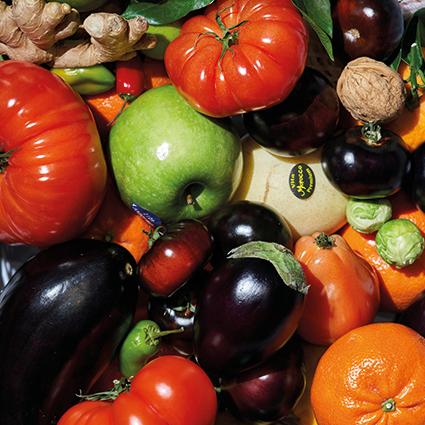
Are you the all-knowing about Utrecht and the Utrecht Science Park? Are you a student or are you still a student and do you fancy a fun evening?
Compete with your team during 8 exciting rounds for one of the prizes in the Utrecht Science Park Pubquiz during Utrecht Science Week.
We start this evening with free pizzas and end with drinks. The organization will give you the first two drinks.
Walk-in and pizzas: 17:00 - 18:00 hrs.
Pub quiz: 18.00 - 20.00 hrs.
Prize-giving ceremony and drinks: 20.00 - 21.00 hrs.
Sign up quickly as there is limited capacity in the café and full=full.
Language
Dutch
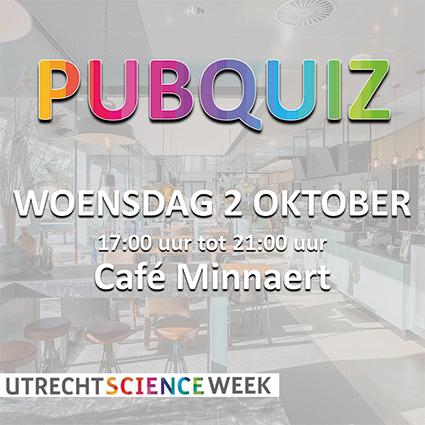

On Wednesday 2 October 2024, the sixth lecture from the Foundation Animales will be held. The goal of the foundation is to improve animal welfare. This year, Daniela Salvatori, will be the speaker. She is professor of Comparative Anatomy and Physiology at the Faculty of Veterinary Medicine at Utrecht University. Salvatori is an international authority on animal-free innovations in education and research.
The title of her lecture is: 'Better science with fewer laboratory animals: a techno-moral revolution'. There will also be side programming which includes demonstrations and presentations related to the transition to animal-free innovation.
Practical information
Lecture: Better science with fewer laboratory animals: a techno-moral revolution (in English)
Date: Wednesday 2 October 2024
Time: coffee and tea from 19:00, after the lecture there will be drinks and side program
About Animales Foundation
Working together to build a future where every animal in the Netherlands gets the care and love it deserves. That is the mission of the Animales Foundation. They focus on improving animal welfare by financial support of scientific research.
This
part of the programme is co-organised by Utrecht Life Sciences.
Language
English
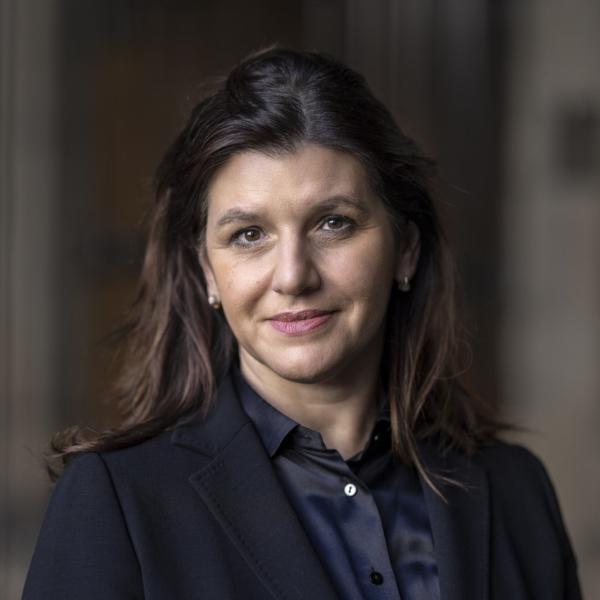
After multiple vibrant editions with 25+ entrepreneurs, the Utrecht Science Park Foundation, Gemeente Utrecht and ROM Utrecht Region are organizing the fifth U-Forward Life Sciences BreakFast ‘Utrecht Science Week edition’.
This edition is taking place on Thursday, October 3rd at the Life Science Incubator at the Utrecht Science Park . All life sciences entrepreneurs from the Utrecht region are invited to join the breakfast session.
Each session a varied program is offered with room for inspiring talks from entrepreneurs. Join the session to network, share ideas and connect with other life sciences entrepreneurs, while enjoying a croissant and good coffee. This session Would you like to participate?
Please register by sending an email to Annemarie Dijkman: annemarie.dijkman@utrechtsciencepark.nl.
Spread the word in your regional life sciences network and join the private LinkedIn group to connect with each other.
Language
Dutch
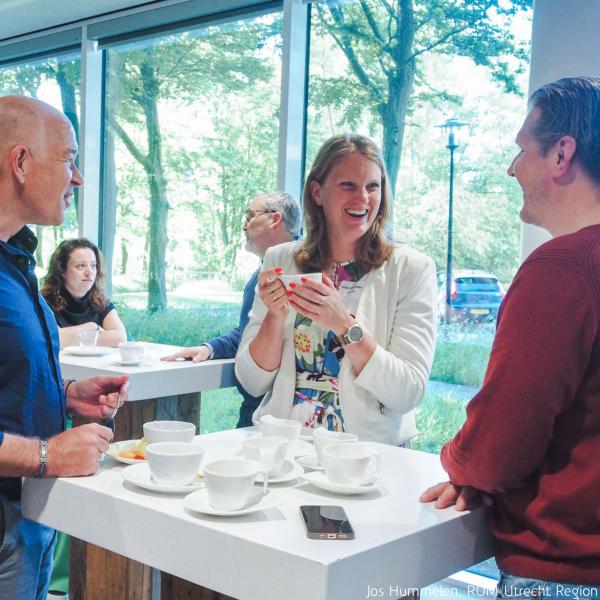

What values should guide academic partnerships, and
how should we engage with industries that may impact health or the planet? We
invite you to a thought-provoking round table discussion to brainstorm the
future of ethical partnerships in academia, initiated by the student
organization IFMSA-NL.
This session will bring together researchers, students, and university staff to explore key questions: What principles should shape our collaborations? How do we address potential conflicts with industries that affect public health or the environment? Through open dialogue and diverse perspectives, we aim to develop a framework for partnerships that reflect our values of sustainability, integrity, and social responsibility.
Register now and join us in shaping a more ethical
academic future! 🌱
This programme element is organised by Utrecht Life Sciences Planetary Health.
Language
English
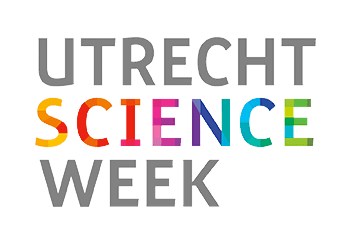

How
does team science contribute to interdisciplinary collaboration within
scientific research? How does it influence innovation and creativity within
research projects? And how can team science contribute to the professional
development of researchers? During this lecture, Jos Malda shares successful
examples from practice and discusses his team's experiences from different
levels. He then engages with table guests to discuss different perspectives.
Afterwards, there will be room for participants to interact with each other.
Jos Malda is
professor of Biofabrication in Translational Regenerative Medicine at the
Regenerative Medicine Center Utrecht, a collaboration of UMC Utrecht and
Utrecht University. With his team, he focuses on the development of innovative
3D bioprinting technologies for creating tissues and organs.
Language
English
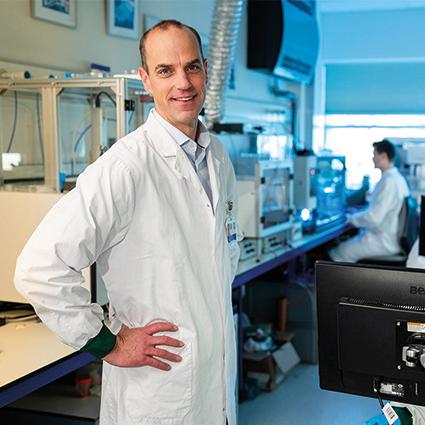

Plenary Session + Health of the Future Fair
Explore the cutting-edge innovations transforming healthcare and laboratory sciences at our exclusive Plenary Session and Health of the Future Fair.
Plenary Session (16:00 – 16:45)
Engage with leaders from industry, healthcare, and academia in a dynamic panel discussion. Discover how automation, digital transformation, and Artificial Intelligence (AI) are revolutionizing labs and healthcare, and learn how educational institutions are evolving to train the next generation of scientists and healthcare professionals.
Presenters (5 min each) and panelists (30 min Q&A) from the biotech industry (Genmab), healthcare and education will discuss several topics, such as:
Bring your questions and insights for an engaging discussion with the expert panel
Program
16.00 Welcome and opening
Rob Ruijtenbeek, Vice President, Head Antibody Discovery Technologies Genmab
AI in the biotech industry:
Genmab
Chris Klijn, Vice President, Head of Discovery Data Science & Target
Discovery Genmab
AI in healthcare research:
UMC Utrecht
Karijn Suijkerbuijk, Full Professor, Translational Medical Oncologist UMC Utrecht
Shaping the Future of
Healthcare and Laboratories
Panelists:
16.45 Conclusions
Health of the Future Fair (16:45 – 18:30)
Network with representatives from leading companies, healthcare institutions, and educational bodies. Discover career opportunities, showcase and experience innovations, and discuss the future of life sciences over drinks and snacks.
Represented are among others: Genmab, Bilthoven Biologicals, DataChaperone, GenDx, Hubrecht Institute, ICAT/KALCIOHealthcare, Mebiose, InSilico and PD VALUE.
Who Should Attend?
1. Students: BSc, MSc, and PhD students in life sciences, medicine, biochemistry, food science, data science and related fields.
For GSLS master students, this event matters as an LSA career event. If you are a student, sign in with your student email address.
2. Utrecht Science Park Employees: Network and explore talent recruitment opportunities.
Join Us:
Walk in from 15:30. Don’t miss this opportunity to be at the forefront of healthcare and laboratory innovation. See you there!
Language
English
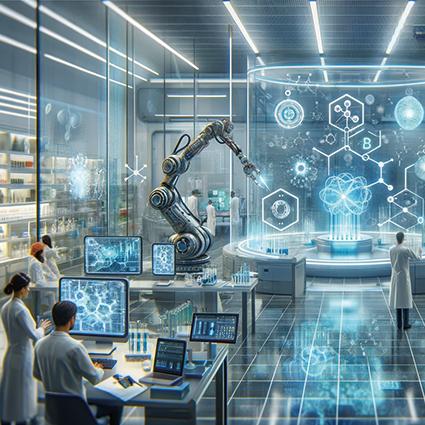

How does the climate crisis affect us emotionally,
and how can we turn these feelings into action? Join us for an engaging event
on eco-emotions, hosted by Utrecht University.
We’ll start with a screening of the short film ‘Over Morgen’ with filmmaker Finn van Dij, which highlights how young people are affected by the climate crisis. Following the film, philosopher Rudolf Kampers will guide us in a dialogue to explore our own climate emotions and how we can allow these feelings in, as well as continuing working on change.
This event is open to employees, scientists, and
students of Utrecht University, as well as Utrecht citizens and climate
advocates who want to reflect on the emotional dimensions of the climate
crisis.
Register now🌍
This programme element is organised by Utrecht Life Sciences Planetary Health.
Language
English
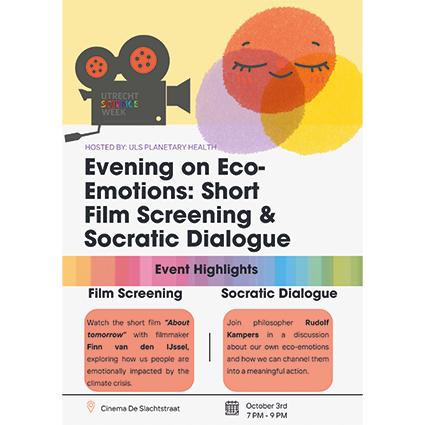
Unique opportunity to visit the Hubrecht Institute!
The Hubrecht Institute is opening its doors for a unique visit to their labs. There is room for 30 visitors, who after a short introduction will be taken in 3 groups to get up close and personal with the core of scientific research. The researchers will take you on their extraordinary quests. Don't miss this opportunity to talk to them about their research!
Programme
13.30 Welcome with coffee
13.45 Welcome and opening
Jeroen den Hertog, managing director Hubrecht Institute
14.15 Start of guided tours along:
- Zebrafish
- Single cell core facility (DNA analysis in individual cells)
- Fruit fly lab
15.15 End of visit
Afterwards, the opportunity to visit the meeting ‘the Lab of the Future’ across the street in the Accelerator, where a researcher of the Hubrecht is also present at the ‘Health of the Future Fair’.
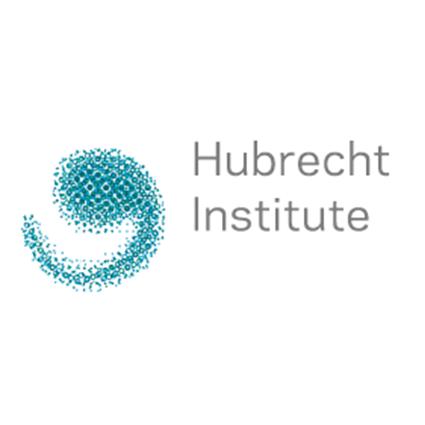

Preventive health has become a cornerstone in
the pursuit of long-term health and ,
playing a crucial role in relieving stress on the healthcare system. One of the
central themes in preventive health therefore is to preserve health and keep
people living healthily for as long as possible.
and the development of are both essential in
supporting this goal.
Preventive health has become a cornerstone in
the pursuit of long-term health and wellbeing,
playing a crucial role in relieving stress on the healthcare system. One of the
central themes in preventive health therefore is to preserve health and keep
people living healthily for as long as possible. Lifestyle interventions
and the development of healthy living environments are both essential in
supporting this goal.
The seminar will showcase how transdisciplinary collaboration —bridging healthcare professionals, researchers, communities, urban planners, and policymakers—are essential in shaping and implementing effective preventive health interventions. Through real life examples of lifestyle interventions and the development of healthy urban neighbourhoods, there is a showcase on how transdisciplinary research is put into practice.
This event is a collaborative effort between the UMC Utrecht prevention platform and the institute 4 Preventive Health (i4PH), part of the EWUU alliance (TU/e, WUR, UU, UMCU).
For whom?
This seminar is particularly interesting for mid-career researchers working on topics related to preventive health, lifestyle and healthy living environments, and who are interested in learning about the work of others and expanding their professional network. However, interested junior researchers, senior researchers and private and public partners are also welcome to participate.
Why join this seminar?
· Real-Life Examples: Real-Life Examples: Explore concrete case studies: Cartesius and Care program Life & Body, showcasing impactful lifestyle interventions and the development of healthy urban neighbourhoods. See firsthand how these initiatives are implemented and their impact on health outcomes.
·
Interaction: Connect and engage in
discussions with like-minded researchers from the EWUU alliance, offering
opportunities for future collaboration on seed funding projects and consortia
for research projects.
·
Community: Be(come) part of a
community committed to advancing preventive health. Join forces to lead
innovative solutions and drive preventive health initiatives across various
sectors.
Programme:
2.30 PM
Doors
open
3.00 PM
Introduction to the EWUU alliance's i4PH and the UMC Utrecht prevention platform.
Presented by:
Tessa Scherphof: Liaison Officer EWUU institute 4 Preventive Health.
Lilian van der Ven: Prevention Coordinator UMC Utrecht.
[Read more...]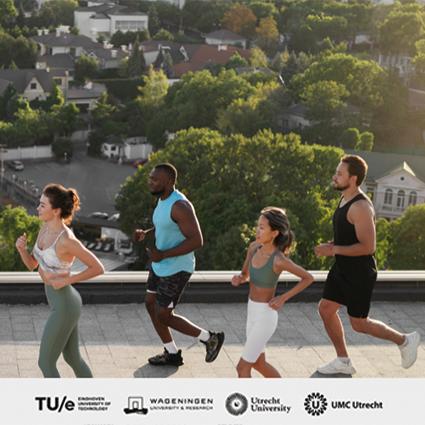
Walk-in and expo: from 14.30 hrs, start Finale 16.15 hrs - 17.15 hrs, drinks afterwards
During the Sustainable City Challenge, students are challenged to design solutions for a more sustainable Utrecht. Together with various partners from the region, teams of students from mbo, hbo and wo work together on sustainable tasks to make Utrecht healthier, more livable and greener.
Topics include greening & biodiversity, mobility, energy, circular and healthy living environments. Participation in the challenge is open to students from ROC Midden Nederland, Hogeschool Utrecht, Utrecht University, MBO Utrecht, MBO Amersfoort, Nimeto, Marnix Academy, Grafisch Lyceum Utrecht and Hogeschool voor de Kunsten Utrecht.
Expo
Visit the expo and engage in conversation with the students to learn more about their ideas for a more sustainable and healthier city.
Final
The most promising ideas will be presented in pitches during the finals. The public will ultimately decide who wins the public prize. Deputy André van Schie awards the prize.
Want to participate as a student in this inspiring challenge? More info and registration via the website.
Want to visit the expo and attend the pitches? You can! Register via the button.
Language
Dutch
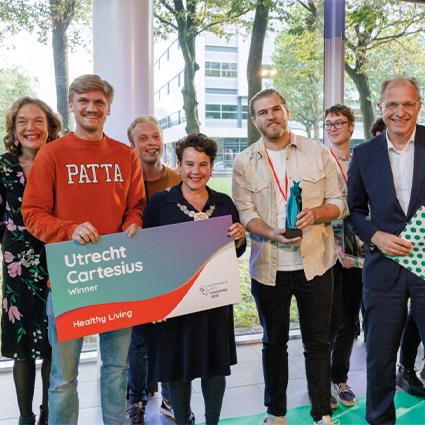
The 'Weekend
van de Wetenschap' is on Saturday 5 and Sunday 6 October and is taking place
across the country, in different cities. From library to companies, and from
university to science park. Everyone opens their doors to give visitors a
unique look behind the scenes in the world of science and technology. Everyone
is welcome, because science is of course for everyone, but the focus lies on
families with children aged between 8 and 14.
This year
will be actively working together with various partners at the Utrecht Science
Park to make science more accessible to the younger target group during the
Weekend van de Wetenschap. Eight organisations at the Utrecht Science Park have
created cool activities to introduce visitors to science in various dimensions.
Participating
organisations
Utrecht
University (and Botanical Gardens), Hubrecht Institute, Westerdijk Instituut,
UMC Utrecht, Wilhelmina Children's Hospital, Princess Máxima Center and KNMI.
KNMI will
open the doors on Saturday 5 October and the other organisations on Sunday 6
October.
On 18 September, all information about the activities will be announced on the website of the 'Weekend van de Wetenschap'. Keep an eye on it!
Check the website (in Dutch) for more information about the locations and activities.
View the map with all locations and activities on the Utrecht Science Park.
Language
Dutch
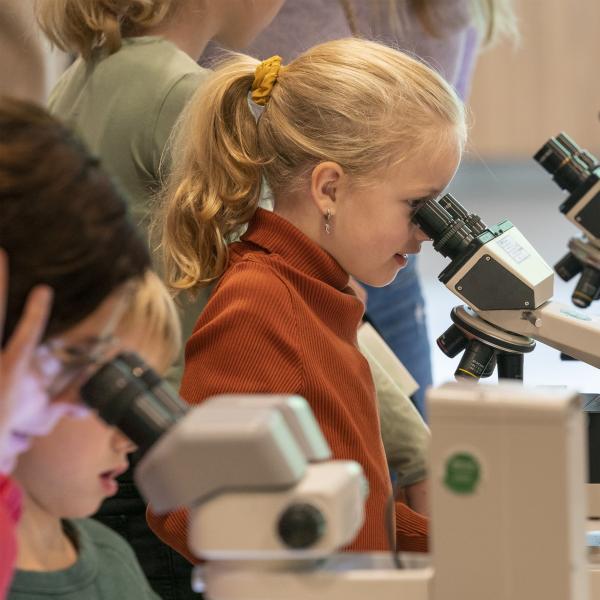
 English
English